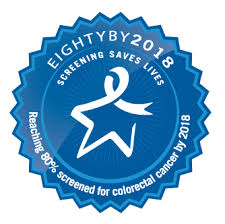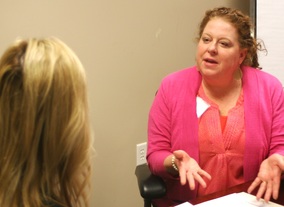 Trainee Update Series: Where Are They Now? Bevin K. Shagoury, Communications & Education Director Tags: Cancer, Detailing Visits, Practice Facilitation, Training Hi, Emily! We’re happy to reconnect with a NaRCAD trainee, and to feature your current work on this month’s blog. Can you tell us a little about yourself and how you ended up working at the National Colorectal Cancer Roundtable? I’ve worked in public health for 12 years, and in seven of those years I’ve focused on cancer screening and prevention. I got to know NaRCAD while working at the Washington State Department of Health, where I designed their approach and curriculum to coach primary care clinics and health systems on quality improvement strategies to increase colorectal cancer screening. Then last summer I joined the American Cancer Society as the National Colorectal Cancer Roundtable’s new associate director. In this role much of my work is still focused on developing educational resources for providers, but I’m also involved in efforts to increase colorectal cancer screening through other channels, such as public education and policy. I learned so much about effective methods for conducting clinical education from the NaRCAD Academic Detailing training that I participated in back in October 2012. I’m grateful to have the opportunity to reconnect with NaRCAD, and thank you for the opportunity to share an update on my work! Tell us a little bit about background and goals of the Roundtable. The Roundtable, established by the American Cancer Society (ACS) and the Centers for Disease Control and Prevention (CDC) in 1997, is a national coalition dedicated to reducing the incidence of and mortality from colorectal cancer in the U.S., through coordinated leadership, strategic planning, and advocacy. Today, the Roundtable is a collaborative partnership with more than 100 member organizations across the nation. Through the efforts of several task groups, the Roundtable advances initiatives that focus on provider education, public education, health policy, quality and disparities issues. Thanks in part to the work of many of our members, colorectal cancer incidence and mortality rates have dropped by over 30% in the U.S. among adults 50 and older in the last fifteen years, with a substantial fraction of these declines due to screening. Yet, despite the good news, colorectal cancer remains the second-leading cause of cancer death in the U.S. when men and women are combined.  The Roundtable is focusing on a great initiative called “80% by 2018.” What’s the story behind this movement? To accelerate efforts to increase colorectal cancer screening, the Roundtable launched the 80% by 2018 initiative in March of 2014. 80% by 2018 is a movement in which hundreds of organizations have committed to substantially reducing colorectal cancer as a major public health problem and are working toward the shared goal of reaching 80% of adults aged 50 and older screened for colorectal cancer by 2018. To date over 650 organizations – including medical professional societies, academic centers, survivor groups, government agencies, cancer coalitions, cancer centers, payers and many others – have signed a pledge to make this goal a priority. If we can achieve 80% by 2018, 277,000 cases and 203,000 colorectal cancer deaths would be prevented by 2030. You can learn more about 80% by 2018 and pledge your organization’s support on our 80% by 2018 webpage.  A trainee role-plays at a NaRCAD 2-day techniques session. A trainee role-plays at a NaRCAD 2-day techniques session. You attended a NaRCAD Academic Detailing Training a few years back to practice skills in clinical outreach education. Can you tell us a little bit about the highlights of your experience? Academic detailing and practice facilitation are relatively new fields, so when I first accepted a job that included these skills I felt a little in over my head! I was up for the challenge, though, since I saw provider education and training as a way to move further upstream in making substantive and sustainable changes that would positively affect public health. It can take a while for new clinical findings to get implemented in primary care, so I saw that academic detailers and practice facilitators serve a key role in getting these findings into clinical practice. My two-day Academic Detailing Training with NaRCAD taught me practical skills to work in this role, and gave me the confidence to know I could be effective without a clinical background. The highlight was the role-playing and one-on-one feedback from experienced academic detailers. Their personal feedback was not something I could have found in a book or online training. What tools from the training do you think are most relevant to active detailers in the field? Some of the most valuable tools I took from the training were the interpersonal skills needed to be effective as an academic detailer. The tips on how to solicit buy in after sharing a practice change was incredibly useful, such as asking: “does this sound like something you’d be willing to try in your practice?” It was also really helpful to learn how to approach sharing a clinical update that could potentially make a provider feel as though they had been delivering inappropriate care. The training taught me how to navigate these discussions by saying that while something might be common practice it’s no longer supported by the latest clinical evidence. In my experience, providers were very receptive to learning new clinical updates when it was shared in such a way that they did not feel they were being reprimanded for not knowing already knowing the latest evidence. Thanks for chatting with us. We’re happy to help get the word out about “80% by 2018” and looking forward to hearing the results of the initiative. Thank you for the opportunity! I enjoyed reconnecting with you and reflecting on how my training with NaRCAD has enriched my work in clinical education. I’d like to encourage any readers that are interested in 80% by 2018 and efforts to increase colorectal cancer screening to learn about the campaign. And there are lots of great tools and resources in the provider education section of our website that might be of particular interest to academic detailers.  Emily Butler Bell is the Associate Director of the National Colorectal Cancer Roundtable. In this role she manages a number of projects that support the 80% by 2018 initiative, a movement in which hundreds of organizations are working toward the shared goal of reaching 80% of adults aged 50 and older screened for colorectal cancer by 2018. Prior to joining the Roundtable, Emily served as the Cancer Screening Quality Improvement Consultant for the Washington State Department of Health, where she designed their approach and curriculum to coach primary care clinics and health systems on quality improvement strategies to increase colorectal cancer screening. Prior to that, Emily worked with the American Cancer Society in Austin, TX as a Cancer Information Specialist and later as a Health Insurance Specialist, where she gained insight into the access and affordability issues surrounding colorectal cancer screening. She holds a Master’s in Public Health from Boston University and a B.A. in Psychology from the University of California, Santa Cruz. Comments are closed.
|
Highlighting Best PracticesWe highlight what's working in clinical education through interviews, features, event recaps, and guest blogs, offering clinical educators the chance to share successes and lessons learned from around the country & beyond. Search Archives
|
